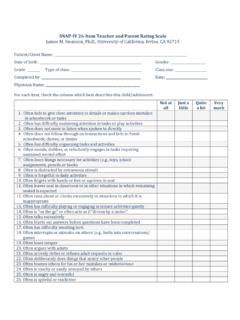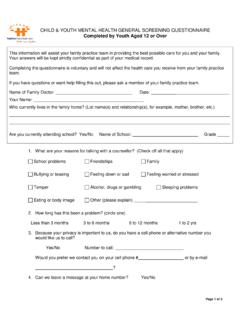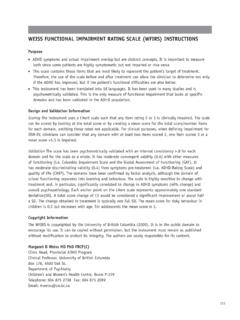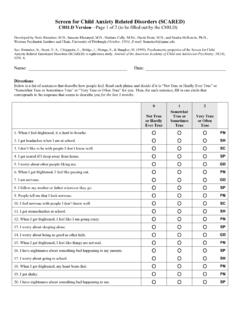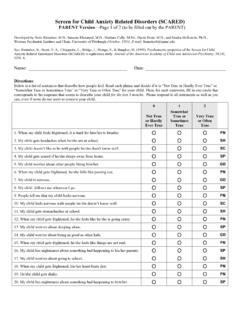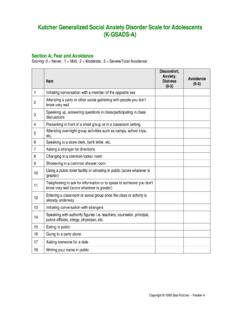Transcription of The SNAP-IV Teacher and Parent Rating Scale
1 The SNAP-IV Teacher and Parent Rating ScaleJames M. Swanson, , University of California, Irvine, CA 92715 Name:_____ Gender:_____ Age:_____ Grade:_____Ethnicity (circle one which best applies): African-American Asian Caucasian Hispanic Other_____Completed by:_____ Type of Class:_____ Class size:_____ For each item, check the column which best describes this child:Not At Just A Quite Very All Little A Bit Much 1. Often fails to give close attention to details or makes careless mistakes in schoolwork or tasks_____ _____ _____ _____ 2. Often has difficulty sustaining attention in tasks or play activities_____ _____ _____ _____ 3.
2 Often does not seem to listen when spoken to directly_____ _____ _____ _____ 4. Often does not follow through on instructions and fails to finish schoolwork, chores, or duties_____ _____ _____ _____ 5. Often has difficulty organizing tasks and activities_____ _____ _____ _____ 6. Often avoids, dislikes, or reluctantly engages in tasks requiring sustained mental effort_____ _____ _____ _____ 7. Often loses things necessary for activities ( , toys, school assignments, pencils, or books)_____ _____ _____ _____ 8. Often is distracted by extraneous stimuli_____ _____ _____ _____ 9.
3 Often is forgetful in daily activities_____ _____ _____ _____10. Often has difficulty maintaining alertness, orienting to requests, or executing directions_____ _____ _____ _____11. Often fidgets with hands or feet or squirms in seat_____ _____ _____ _____12. Often leaves seat in classroom or in other situations in which remaining seated is expected_____ _____ _____ _____13. Often runs about or climbs excessively in situations in which it is inappropriate_____ _____ _____ _____14. Often has difficulty playing or engaging in leisure activities quietly_____ _____ _____ _____15.
4 Often is on the go or often acts as if driven by a motor _____ _____ _____ _____16. Often talks excessively_____ _____ _____ _____17. Often blurts out answers before questions have been completed_____ _____ _____ _____18. Often has difficulty awaiting turn_____ _____ _____ _____19. Often interrupts or intrudes on others ( , butts into conversations/games)_____ _____ _____ _____20. Often has difficulty sitting still, being quiet, or inhibiting impulses in the classroom or at home_____ _____ _____ _____21. Often loses temper_____ _____ _____ _____22.
5 Often argues with adults_____ _____ _____ _____23. Often actively defies or refuses adult requests or rules_____ _____ _____ _____24. Often deliberately does things that annoy other people_____ _____ _____ _____25. Often blames others for his or her mistakes or misbehavior_____ _____ _____ _____26. Often touchy or easily annoyed by others_____ _____ _____ _____27 Often is angry and resentful_____ _____ _____ _____28. Often is spiteful or vindictive_____ _____ _____ _____29. Often is quarrelsome_____ _____ _____ _____30. Often is negative, defiant, disobedient, or hostile toward authority figures_____ _____ _____ _____31.
6 Often makes noises ( , humming or odd sounds)_____ _____ _____ _____32. Often is excitable, impulsive_____ _____ _____ _____33. Often cries easily_____ _____ _____ _____34. Often is uncooperative_____ _____ _____ _____35. Often acts smart _____ _____ _____ _____36. Often is restless or overactive_____ _____ _____ _____37. Often disturbs other children_____ _____ _____ _____38. Often changes mood quickly and drastically_____ _____ _____ _____39. Often easily frustrated if demand are not met immediately_____ _____ _____ _____40.
7 Often teases other children and interferes with their activities_____ _____ _____ _____Check the column which best describes this child:Not At Just A Quite VeryAll Little A Bit Much41. Often is aggressive to other children ( , picks fights or bullies)_____ _____ _____ _____42. Often is destructive with property of others ( , vandalism)_____ _____ _____ _____43. Often is deceitful ( , steals, lies, forges, copies the work of others, or cons others)_____ _____ _____ _____44. Often and seriously violates rules ( , is truant, runs away, or completely ignores class rules)_____ _____ _____ _____45.
8 Has persistent pattern of violating the basic rights of others or major societal norms_____ _____ _____ _____46. Has episodes of failure to resist aggressive impulses (to assault others or to destroy property)_____ _____ _____ _____47. Has motor or verbal tics (sudden, rapid, recurrent, nonrhythmic motor or verbal activity)_____ _____ _____ _____48. Has repetitive motor behavior ( , hand waving, body rocking, or picking at skin)_____ _____ _____ _____49. Has obsessions (persistent and intrusive inappropriate ideas, thoughts, or impulses)_____ _____ _____ _____50. Has compulsions (repetitive behaviors or mental acts to reduce anxiety or distress)_____ _____ _____ _____51.
9 Often is restless or seems keyed up or on edge_____ _____ _____ _____52. Often is easily fatigued_____ _____ _____ _____53. Often has difficulty concentrating (mind goes blank)_____ _____ _____ _____54. Often is irritable_____ _____ _____ _____55. Often has muscle tension_____ _____ _____ _____56. Often has excessive anxiety and worry ( , apprehensive expectation)_____ _____ _____ _____57. Often has daytime sleepiness (unintended sleeping in inappropriate situations)_____ _____ _____ _____58. Often has excessive emotionality and attention-seeking behavior_____ _____ _____ _____59.
10 Often has need for undue admiration, grandiose behavior, or lack of empathy_____ _____ _____ _____60. Often has instability in relationships with others, reactive mood, and impulsivity_____ _____ _____ _____61 Sometimes for at least a week has inflated self esteem or grandiosity_____ _____ _____ _____62. Sometimes for at least a week is more talkative than usual or seems pressured to keep talking_____ _____ _____ _____63. Sometimes for at least a week has flight of ideas or says that thoughts are racing_____ _____ _____ _____64. Sometimes for at least a week has elevated, expansive or euphoric mood_____ _____ _____ _____65.
